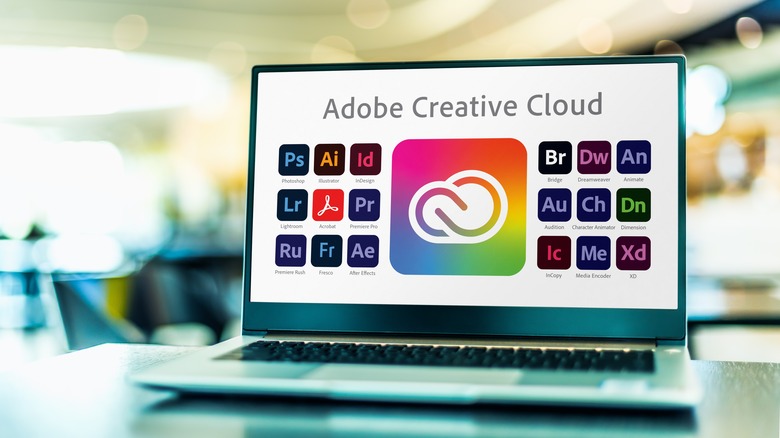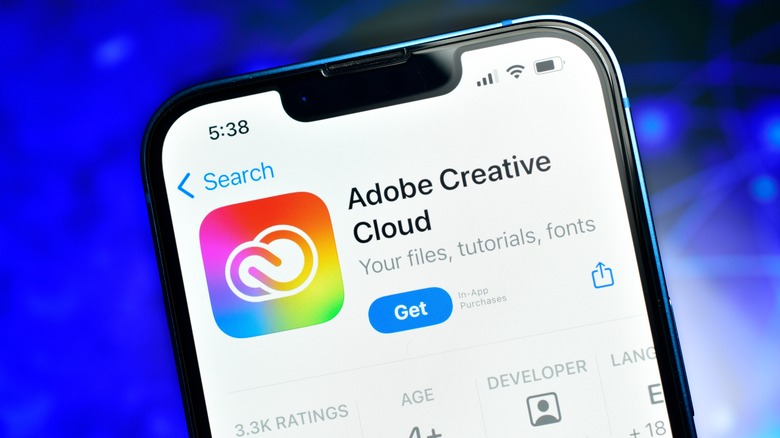Why Adobe's Terms Of Service Update Has Users Furious
Adobe — one of the world's largest software companies — is in the middle of a major controversy. Back in February 2024, the company silently made changes to the terms and conditions applicable to several of its software products. Most Adobe users remained oblivious to these changes until the company set up a notification to users four months later, in the first week of June. This notification mandated that users accept Adobe's updated terms and conditions, failing which they would be locked out of using the software suite. While this method was controversial enough, it was what these updated terms and conditions said that left several Adobe users seething.
The updated terms contained verbiage that implied that by agreeing to them, the user gave Adobe explicit permission to access all content created using the platform. Adobe went on to add that the company may use automated or manual methods for these content review processes. Several users also suspected that these updated terms also granted permission for Adobe to train their generative AI tool, Adobe Firefly, using data from the creator's content.
I just cancelled my Adobe licence after many years as a customer.
The new terms give Adobe "worldwide royalty-free licence to reproduce, display, distribute" or do whatever they want with any content I produce using their software.
This is beyond insane. No creator in their... pic.twitter.com/8UK3ur3WtH
— Sasha Yanshin (@sashayanshin) June 7, 2024
Soon after people began noticing this controversial change, many took to social media platforms in frustration. These included several high-profile users ranging from famous designers and movie directors — all of whom use Adobe products. They were particularly concerned about the privacy aspect of Adobe products and pointed to the fact that these terms and conditions essentially meant they would end up breaking NDAs (Non-Disclosure Agreements) they have signed with clients. Among those who reacted to these changes included movie director Duncan Jones, known for directing titles like "Source Code," "Moon," and "Warcraft." Designer Wetterschneider also took to Twitter to vent his frustration at the changes.
Adobe reacts to TOS updates, making things even worse
After people took to social media to complain about the changes, Adobe was forced to issue a statement in a bid to clarify its position. Instead of calming down users, this had the opposite effect. The company took to Twitter and even came up with a dedicated blog post trying to explain things. Adobe's statement — which is still visible on its Twitter page — only raised concerns about how the company would use user-generated content to train its AI products.
The statement reiterated why the company needs a "limited license to access content," and that this access would be used to improve Adobe services and protect against abusive content. The statement went on to talk about the controversial manual review process. This process essentially means that a human (possibly an Adobe employee or contract worker) can access content saved on Adobe platforms if they suspect there is illegal content hosted on it.
While these statements did not make Adobe software users feel any better, the company did use the opportunity to clarify that it does not train its Firefly AI model using data from consumers. The blog post also reiterated that Adobe will never assume ownership of a customer's work.
Is Adobe Creative Cloud safe to use if you have signed an NDA?
Despite Adobe's statements clarifying its position, the key takeaway is that the company does have access to the content created and stored on its cloud servers. Given that this may be in breach of the confidentiality agreements that creators may have signed with their clients, it would be interesting to see their reaction to it. Meanwhile, Adobe has said that it will be making changes to the updated terms and conditions to reflect the changes explained in its last blog post. It is unclear at this moment whether these changes would address the confidentiality agreement being discussed above and how soon the company intends to update them.
A lot of creators — including Wetterschneider — are still unhappy with Adobe's response to the issue and even claim that the company has "exhibited a pattern of abusive behavior towards creators." Several users are even considering unsubscribing to Adobe's offerings and taking their businesses elsewhere. It is important to note that according to an Adobe content analysis FAQ, Adobe only performs "content anylsis on content processed or stored on Adobe's severs," and does not analyze content stored locally on your device. It would be interesting to see if a possible unsubscription campaign or a mass switch to alternatives to Adobe products would lead to the company reconsidering its current position.


